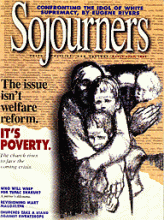I AM WRITING because I am disturbed by Jill Carroll Lafferty’s review of The Dilbert Principle. It is so interesting to hear again and again how many paper pushers find their voice in Dilbert, as if the strip is able to say all the things they have wanted to say, or as if the strip provides some critical insight into the plight of the white-collar worker.
However, this is precisely the problem. Dilbert offers no critical insight. If anything, the strip contributes to the pacification of disenchanted, unfulfilled, and downtrodden office employees whose efforts are continually crushed and whose security is based on the whims of a self-interested manager and an unpredictable market. Rather than taking the time to examine the larger implications and root causes of their undesirable positions, corporate employees seem to prefer to read Dilbert, and proceed to laugh at themselves and their selfish managers.
Even the characters in Dilbert finally succumb to the backbiting, career-propelling behavior that is demonstrated by the higher-ups. Dilbert is simply (and dangerously, I would add) anesthesia for a particular social category that is crying out for some justice. The strip is not a step toward the fulfillment of that justice, but rather toward the silencing, through comedy, of those ultimately affected by corporate injustice.
Read the Full Article
